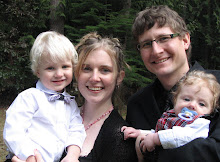Prayer and interpretation
I have been in some thought and consideration on the essence of prayer and am intrigued by what Matthew again, has written here. I would enjoy your comments.
"I remember being part of a movement in the late 90s that believed that if enough people prayed fervently and continuously, there would be a great revival in the Church, and lots of people would get saved.I think that there may be something to this principle. When the Church humbles herself to pray, God does hear, and turn, and heal the land.But there are a few problems with the revivalist prayer model. First, there is no model. Second, its success depends solely on the amount of time people spend fervently asking God to do things, specifically to send revival. Thirdly, it has no format for intercessors to structure their prayer time. Fourth, it fails to take into account the fact that the church has never stopped praying. Fifth, it fails to take into account the fact that it is not only the living who are praying, but also all those who have died in Christ.So, what if a few evangelicals start to meet under a haystack and pray 24-7? This is the Tipping Point for Christendom?Do the math. Try and estimate how many Christians have died over the past 2000 years. Then, consider that all these saints now pray ceaselessly before the throne of God. Think millions of saints, billions of prayers. Then, think of the thousands of Catholic, Orthodox and Anglican monks that pray around the clock in monasteries around the world. Then, think of the corporate prayers that happen every day at the Catholic Mass worldwide. Then, think of the prayers that millions of Orthodox Christians pray every morning and evening. Then, think of the few thousand Moravian-style 'prayer warriors' out there today, praying in their shared spaces, fanning their own evangelical fervor (which isn't a bad thing!).Now, more prayer never hurts, and I am happy whenever anyone displays sincere passion about God. But let's be honest. The Moravian, 24-7 (see the link on my sidebar) and House of Prayer movements represent mainly cultural shifts in the evangelical landscape. I think there are some really interesting things happening in the 24-7 Prayer Rooms. I really get excited when I hear about young people, especially skinheads and punks, becoming excited about prayer, and finding authentic, creative expression for their faith in God.But seriously. God isn't going to suddenly change America or Europe into Bible belts simply because a few thousand more people start 'REALLY praying'.
Prayer occurs on groggy mornings and exhausted evenings. Those who hope in the Lord, they often hope alone, or hungry, or while running for their lives. They may hope while half-asleep, grumpy, doubtful and despondent. Hoping is not the sensation that all shall be well. It is the act of waiting at the door for the savior to knock"
So then, what is prayer? How have you discovered communing with the Almighty God and Creater of the Universe to be? Have you discovered a mode that benefits you in your relationship with Chirst?
I remember someone once scolding me for praying a very short (and according to them) irreverent prayer before a meal. But in truth, my thoughts were extremely sincere and had little to do with the way in which they were delivered. I was thankful and I shared my thanks. I was not rude. But the mode I used was not what was expected and they thought I was in errency as to God's will and desire!! Over a little prayer. But that is what we do, isn't it. Call our interpretation of God's Word God's sovereign will for mankind. And in such terms we have made war and killings and extortion and a host of other things a top on our priority list as Christians.


The most important modes in my life are centering prayer (http://contemplative.org/index.htm), lectio divina, Taize, silence, the sign of the cross (thank you Central America) and liturgy.
ReplyDeleteI completely agree with the quotes you posted, especially with regards to the prayers of the dead saints. I think we really tend to forget this in the modern-day Protestand church.